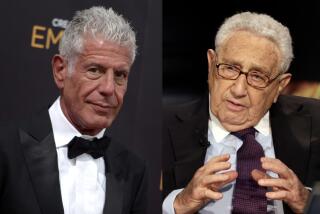Amid the Rubble
- Share via
Henry A. Kissinger, former secretary of state, thinks that arms-control negotiations should start with policy talks at the top. As it is, the action is near the bottom, where bureaucratic theorists pound the real issues into a rubble of statistics about throw-weight and warheads that lose their meaning even for the people at the top.
Nothing makes his case better than the current bickering in Washington, Geneva and Moscow over bits and pieces of nuclear strategy when nobody seems to have--or at least communicate--a clear idea of the strategy itself.
Congress and the Administration are locked in battle over whether a 1972 treaty that puts strict limits on missile defenses now and in the future means what it says. Defense Secretary Caspar W. Weinberger pushes a shoddy piece of legal work that says, in effect, anything goes because it would support his goal of rushing a jury-rigged “Star Wars” system into space as soon as possible. But there is no evidence that the missile defenses that he wants are part of a larger strategy or that it would make sense even if they were.
Negotiations have bogged down on a proposal that the United States and the Soviet Union pull all of their medium-range missiles out of Europe. The deadlock arises not from doubts that such a withdrawal would be wise in a strategic context but over whether the United States could convert the medium-range missiles that it removes to short-range missiles. Soviet negotiators say that short-range missiles are another subject altogether. U.S. spokesmen say that the Soviets are reneging on an earlier position. What results is more rubble to block the path to serious efforts to reduce weapons.
As we understand Kissinger’s thesis, the two powers would discuss what each wants to achieve over the next 10 or 15 years, agree on areas where there is common interest and areas where there must be what has been called “managed rivalry,” and then fit arms control into that framework.
Secretary of State George P. Shultz will go to Moscow for meetings with Foreign Minister Eduard A. Shevardnadze next month. What better opportunity to tell the Soviets what the United States thinks the world should look like at the turn of the century? If it were us, we would say that this future would include Soviet troops out of Afghanistan, democracy in Nicaragua, the Third World climbing out of debt, human rights spreading, fewer troops poised to be at each other’s throat in and around Europe, nuclear weapons being beaten into plowshares by the thousands.
But grand strategy in foreign policy is not the Reagan Administration’s strong suit, and there is not much time to shape an Administration view of the future before Shultz’s plane leaves. And there’s the rub, buried in the rubble.
More to Read
Sign up for Essential California
The most important California stories and recommendations in your inbox every morning.
You may occasionally receive promotional content from the Los Angeles Times.













